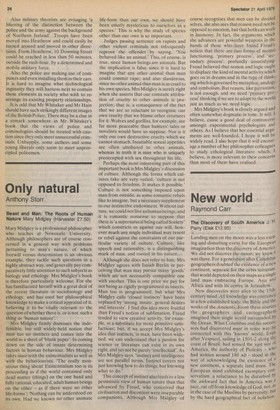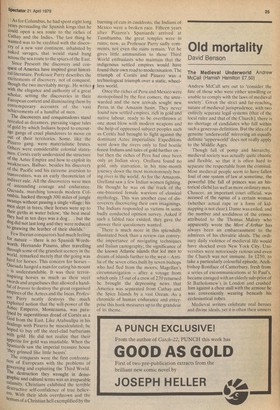New world
Raymond Carr
The Discovery of South America J. H. Parry (Elek £12.95) Landing men on the moon was a less excit. ing and disturbing event for the European imagination than the discovery of America. We did not discover the moon; we knew it was there. For a generation after Columbus geographers doubted the existence of a new continent, separate for the orbis terrartIth. that world depicted on their maps as a single land mass embracing Europe. Asia and Africa and with its centre in Jerusalem.
New discoveries were alien to the 15th. century mind. All knowledge was contained in a few established texts: the Bible and the works of the Ancients. From these sources the geographers and cartographers imagined their single world surrounded by the Ocean. What Columbus and his successors had discovered must in some way be connected with this 'known' world. Even after Vespucci. sailing in 1501-2 along the coast of Brazil, had sensed the vast size (II America. the authority of Ptolemy — whO had written around 140 AD stood in the way of acknowledging the existence of a new continent, a separate land mass. The European mind exhibited exemplary conservatism, a reluctance to be disturbed by the awkward fact that in America was 3 race, cut off from knowledge of God, not. as in the case of the Muslims by perversity, but by the hard geographical fact of isolation. ' As for Columbus, he had spent eight long years persuading the Spanish kings that he could open a sea route to the riches of Cathay and the Indies. The last thing he wanted was to be credited with the discovery of a new vast continent, inhabited by naked savages, that would stand bang across the sea route to the spices of the East.
Since Prescott the discovery and conquest of America have inspired great historical literature. Professor Parry describes the excitements of discovery, not of conquest, though the two inevitably merge. He writes With the elegance and authority of a great scholar, setting the discoveries in their European context and illuminating them by contemporary accounts of the vast achievements of a handful of men.
The discoverers and conquistadores stand revealed as dreamers, pursuing vague tales of gold by which Indians hoped to encourage gangs of cruel plunderers to move on out of their territories. Some, like the Pizarro gang, were materialistic brutes. Others were considerable colonial statesmen. Cortes early understood the structure of the Aztec Empire and how to exploit its weaknesses. Balbao, besides his discovery of the Pacific and his extreme aversion to transvestites, was an early theoretician of indirect rule. All the discoverers were men of astounding courage and endurance. Ouesada, marching towards modern Colombia, hacked through 300 miles of jungle swamps without passing a single village; his Men slept in trees, their horses were up to their girths in water below; 'the best meal they had in ten days was a dog. . . but the dog did not last long and they were reduced to gnawing the leather of their shields.'
Few Iberian conquerors had much feeling for nature there is no Spanish WordsWorth. Hernando Pizarro, after travelling through some of the grandest scenery in the world, remarked merely that the going was hard for horses. This concern for horses Quesada hanged a man for eating his mount IS understandable. It was their terrorinspiring horses as much as their steel swords and arquebuses that allowed a handful of bravos to destroy the great organised empires of the Aztecs and the Incas. Professor Parry neatly destroys the much exploited notion that the will-power of the Aztec Emperor, Montezuma, was paraiYsed by superstitious dread of Cortes as a God from the East. Like Atahuallpa in his dealings with Pizarro he miscalculated; he hoped to buy off the steel-clad barbarians With gold. He did not realize that their aPPetite for gold was insatiable. When the SPaniards saw the imperial treasure house they grinned like little beasts'. The conquests were the first confrontation of Europeans with the problems of gOverning and exploiting the Third World. The destruction they wrought in *demographic and cultural terms was an irreparable calamity. Christians exhibited the terrible destructive self-confidence of true believers. With their idols overthrown and the terrors of a Christian hell exemplified by the burning of cats in cauldrons, the Indians of Mexico were a broken race. Fifteen years after Pizarro's Spaniards arrived at Tumibamba, the great temples were in ruins; now, as Professor Parry sadly com ments, not even the ruins remain: Yet he gives little ammunition to those Third World enthusiasts who maintain that the indigenous settled empires would have found their own road to modernisation. The triumph of Cortes and Pizarro was a technological triumph over a static, wheelless world.
Once the riches of Peru and Mexico were monopolised by the first corners, the unreWarded and the new arrivals sought new Perus in the Amazon basin. They never found new settled empires. rich in gold and native labour, ready to be overthrown at one stout blow with modern weapons and the help of oppressed subject peoples such as Cortes had brought to fight against the dominant Aztec imperialists. Expeditions went down the rivers only to find hostile forest Indians and tales of gold further on but then the riches of Peru had once been only an Indian story. Orellana found no gold, only starvation, in his nine-month journey down the most monotonously boring river in the world. As for the Amazons. Orellana saw a few Indian women fighting. He thought he was on the track of the one-breasted female warriors of classical mythology. This was another case of discoverers discovering their own imaginings. The Indians responded as victims in some badly conducted opinion survey. Asked if such a fabled race existed, they gave the answer their questioners wanted.
-There is much more in this splendidly illustrated book than a review can convey: the importance of navigating techniques and Italian cartography; the significance of the known Atlantic islands that led men to dream of islands further to the west Antiha of the seven cities built by seven bishops who had fled from the moors; Magellan's circumnavigation after a voyage from which only 15 out of a crew of 270 returned he brought the depressing news that America was separated from Cathay and the Spice Islands by a vast Ocean. As a chronicle of human endurance and enterprise this book measures up to the grandeur of its theme.







































 Previous page
Previous page